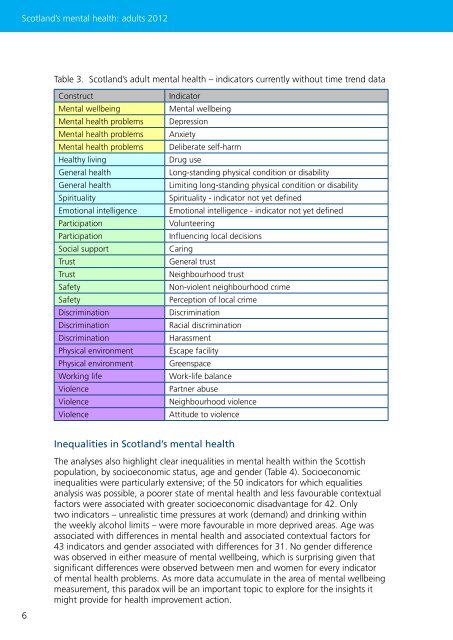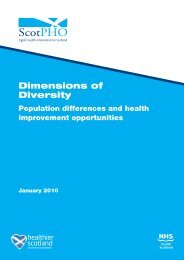Briefing paper - Scottish Public Health Observatory
Briefing paper - Scottish Public Health Observatory
Briefing paper - Scottish Public Health Observatory
You also want an ePaper? Increase the reach of your titles
YUMPU automatically turns print PDFs into web optimized ePapers that Google loves.
Scotland’s mental health: adults 2012Table 3. Scotland’s adult mental health – indicators currently without time trend dataConstructMental wellbeingMental health problemsMental health problemsMental health problems<strong>Health</strong>y livingGeneral healthGeneral healthSpiritualityEmotional intelligenceParticipationParticipationSocial supportTrustTrustSafetySafetyDiscriminationDiscriminationDiscriminationPhysical environmentPhysical environmentWorking lifeViolenceViolenceViolenceIndicatorMental wellbeingDepressionAnxietyDeliberate self-harmDrug useLong-standing physical condition or disabilityLimiting long-standing physical condition or disabilitySpirituality - indicator not yet definedEmotional intelligence - indicator not yet definedVolunteeringInfluencing local decisionsCaringGeneral trustNeighbourhood trustNon-violent neighbourhood crimePerception of local crimeDiscriminationRacial discriminationHarassmentEscape facilityGreenspaceWork-life balancePartner abuseNeighbourhood violenceAttitude to violenceInequalities in Scotland’s mental healthThe analyses also highlight clear inequalities in mental health within the <strong>Scottish</strong>population, by socioeconomic status, age and gender (Table 4). Socioeconomicinequalities were particularly extensive; of the 50 indicators for which equalitiesanalysis was possible, a poorer state of mental health and less favourable contextualfactors were associated with greater socioeconomic disadvantage for 42. Onlytwo indicators – unrealistic time pressures at work (demand) and drinking withinthe weekly alcohol limits – were more favourable in more deprived areas. Age wasassociated with differences in mental health and associated contextual factors for43 indicators and gender associated with differences for 31. No gender differencewas observed in either measure of mental wellbeing, which is surprising given thatsignificant differences were observed between men and women for every indicatorof mental health problems. As more data accumulate in the area of mental wellbeingmeasurement, this paradox will be an important topic to explore for the insights itmight provide for health improvement action.6



